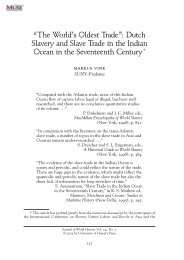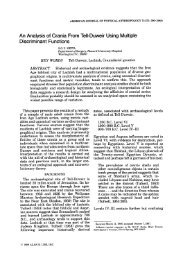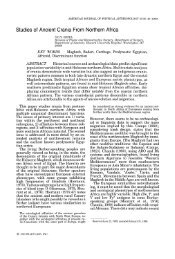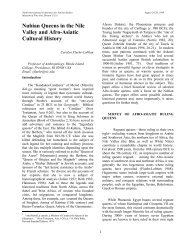THE FALSITY OF HEGEL'S THESES ON AFRICA
THE FALSITY OF HEGEL'S THESES ON AFRICA
THE FALSITY OF HEGEL'S THESES ON AFRICA
You also want an ePaper? Increase the reach of your titles
YUMPU automatically turns print PDFs into web optimized ePapers that Google loves.
Camara / HEGEL’S <strong>THE</strong>SES <strong>ON</strong> <strong>AFRICA</strong> 83<br />
unfamiliar reader Diop’s engaging work. In this same order of<br />
ideas—but this time from a socioeconomic angle—I will resume<br />
the debate where it was left off. My brief study shows that it is that<br />
very Hegelian dialectic that excludes Africa from the universal history,<br />
that fully reinstates it into the history of the world. I underline<br />
some ambiguities and falsities and my refutation of Hegelian theses,<br />
thus, comes from within Africa and limits itself to two major<br />
aspects: First, I discuss his theses on slavery, which leads to the<br />
problem of class formation, and second, I look at his concept of the<br />
state and more particularly of the state in Africa. But before that, I<br />
discuss Negritude’s detournement of Hegel’s theses for the cause of<br />
a specific Black culture as expressed in Léopold S. Senghor’s work. 1<br />
GEO-CLIMATIC DETERMINISM<br />
Ideologies such as Négritude offer a general theory of the African,<br />
which surprisingly presents striking similarities to Hegelian<br />
theses. 2 But Negritude precisely claims a neat opposition to them.<br />
By affirming a so-called absolute specificity of Africa, Hegel has<br />
tried to deduce a structural lethargy and a lack of civilization in<br />
Africa. Paradoxically, African intellectuals who opposed Hegel<br />
saw in his theses all the elements they needed to affirm and justify<br />
the existence of a specific African civilization that is irremediably<br />
opposed to the European one, hence Amadi A. Dieng’s (1975) term<br />
of “Afro-Hegelianism.” The only difference here is that what Hegel<br />
proposes as an absolute lack is considered absolute asset by<br />
Negritude. With Senghor, Negritude becomes a general theory of<br />
the African. It is a coherent and systematic ensemble of ideas that<br />
first reflects a reaction to the colonial past and, second, a Humanism<br />
that transcends racial particularisms to reach the Civilization of<br />
the Universal. 3 However, Negritude is most often glimpsed through<br />
race and psychology. Senghor stresses the racial specificities peculiar<br />
to all people of African descent, the basic theme being the<br />
“Black soul,” only possessed by people of African descent.<br />
Senghor advocates the African’s unique culture, strong degree of<br />
emotion and sensuality, and the Negro’s natural inclination to art




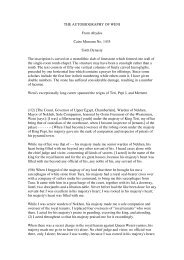
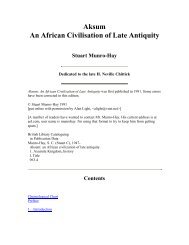
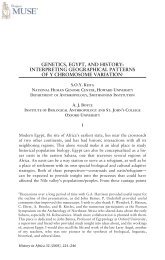

![The Negro trail blazers of California [microform] : a ... - Homestead](https://img.yumpu.com/32436613/1/174x260/the-negro-trail-blazers-of-california-microform-a-homestead.jpg?quality=85)
